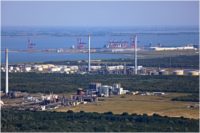A large field is being converted into a giant parking lot for up 1,700 heavy trucks within 30 kilometers of the U.K.’s busiest ferry port at Dover and the Channel tunnel entrance at Folkestone. The Sevington Inland Border Facility (IBF) is one of seven being procured around the country under a $360-million government fast-track effort announced by senior minister Michael Gove this summer. The IBF program is being rushed through before the U.K. leaves Europe’s Custom Union and Single Market on Dec. 31 as the final stage of Brexit; the country’s departure from the European Union (E.U.).
During the decades of E.U. membership, U.K. traders could send goods and agricultural produce across the English Channel almost unhindered by customs arrangements. That amounted to 220 million tonnes last year. But all that ends within a few weeks.
On Jan. 1, 2021, “the U.K. will leave the single market and customs union, regardless of (any) agreement…with the European Union on its future trade relationship,” stated Gove. After this December, officials forecast the number of customs declarations will rise from 55 million a year so far to 270 million. That added bureaucracy will cause a tailbacks of up 7,000 trucks on approach roads to Dover, Folkestone and other Kent crossing points, according to a government projection.
To avoid chaos on the coastal highways, the government is investing $265 million expanding ports facilities and another $360 million for the remote IBFs, where trucks will be parked and processed.
With time running out, the government this September gave itself powers to bypass local planning laws and impose IBFs at seven locations. The Special Development Orders require the IBFs to be removed by the end of 2026.
The significance of that deadline is unclear to Francis Tyrrell, a partner in the London-based law firm Pinsent Mason. Without future changes to trading rules with the E.U. or significant technology advances, “it is not clear to me why the need for infrastructure would fall away," he notes. But even with accelerated planning and procurement measures, the IBFs are unlikely to be ready in time.
Late last month, the government’s special Border and Protocol Delivery Group assessed the chances of their timely completion to be in doubt, with major risks apparent in a number of key areas, according to a review by the National Audit Office.
Among those projects is doubt is the IBF, which occupies a large portion of a 93-hectare greenfield plot close to the village of Sevington, Kent.
Next to the M20 highway to the coast and within 40 km of both the port of Dover and the Channel tunnel, the small rural site is well placed to handle up to 1,700 trucks, overlooked by the village’s 12th-century-era church.




Post a comment to this article
Report Abusive Comment